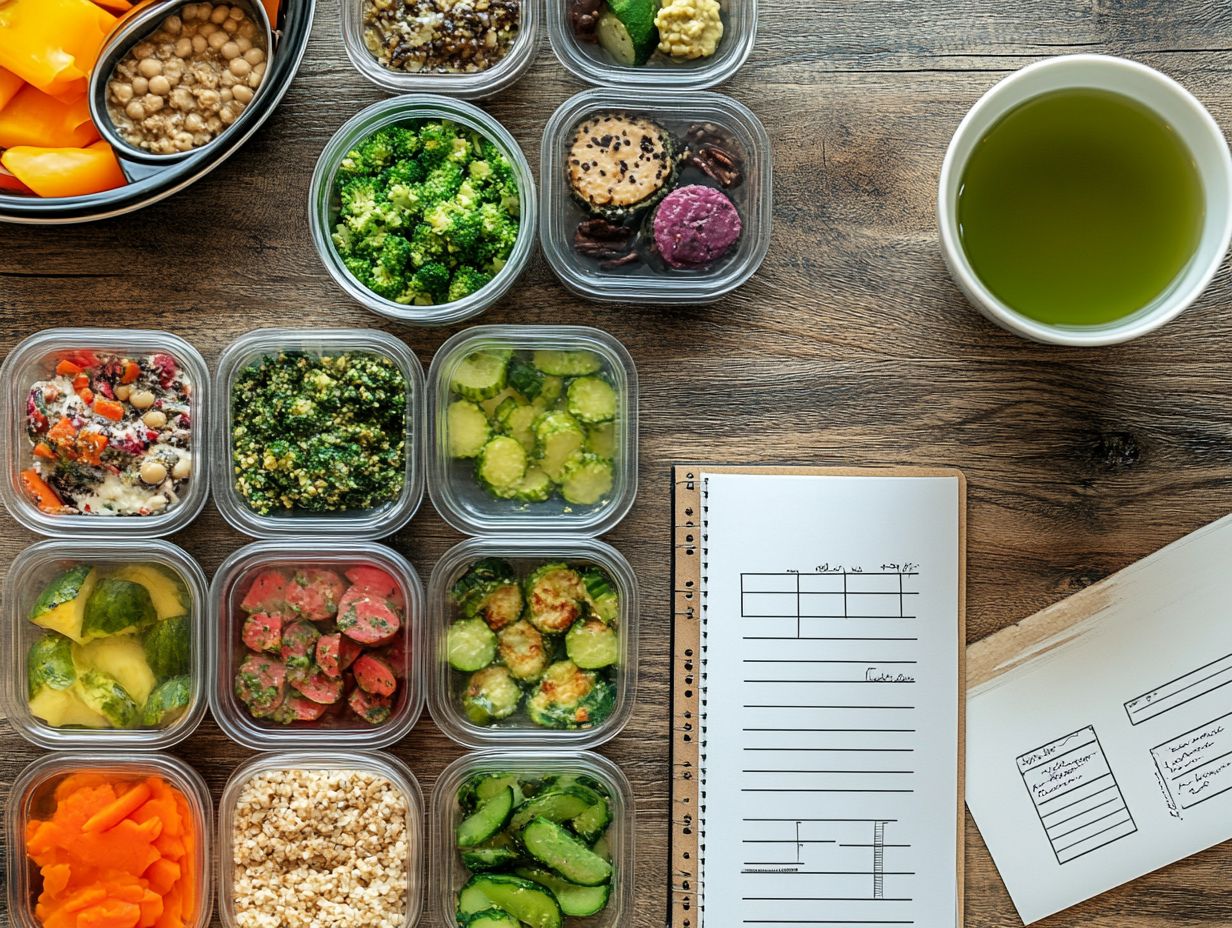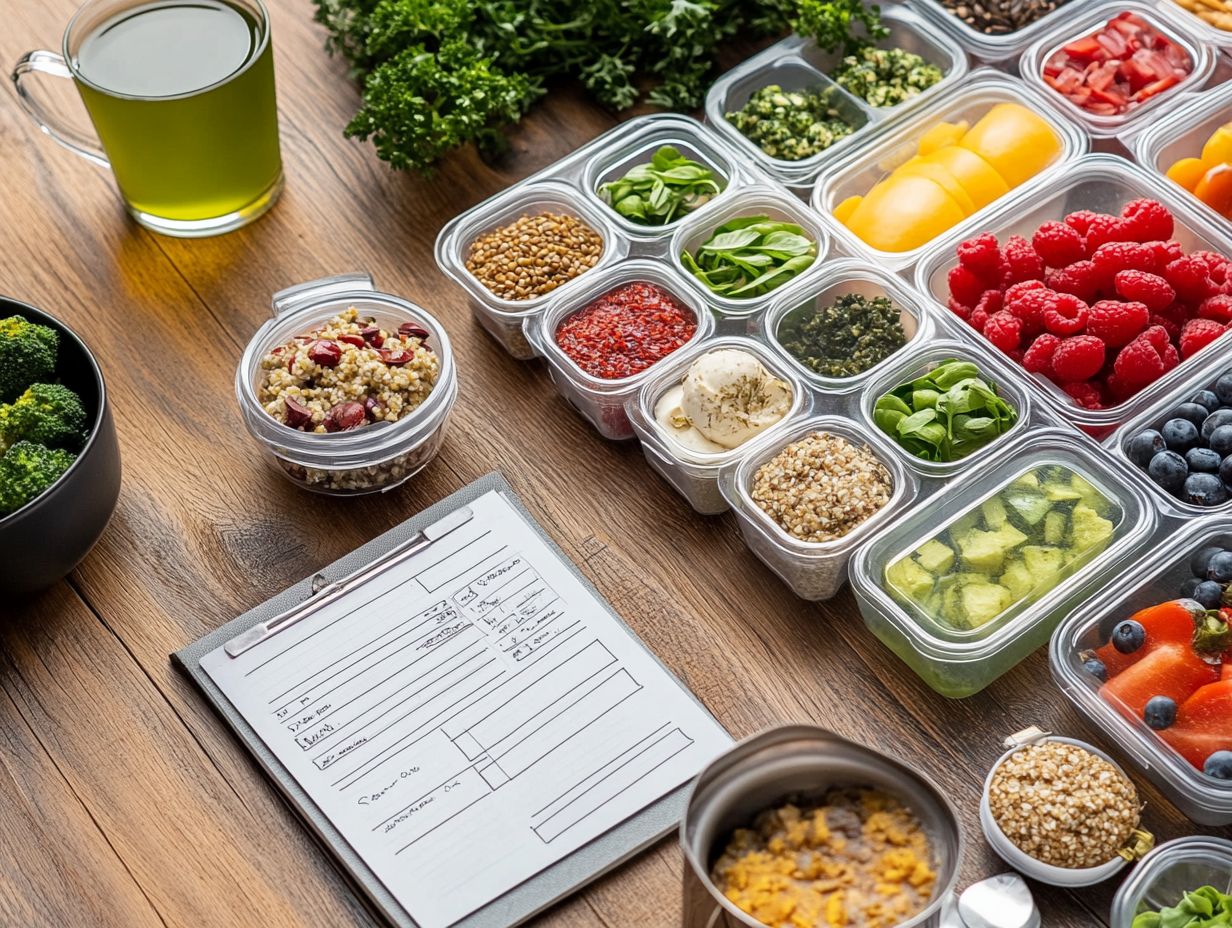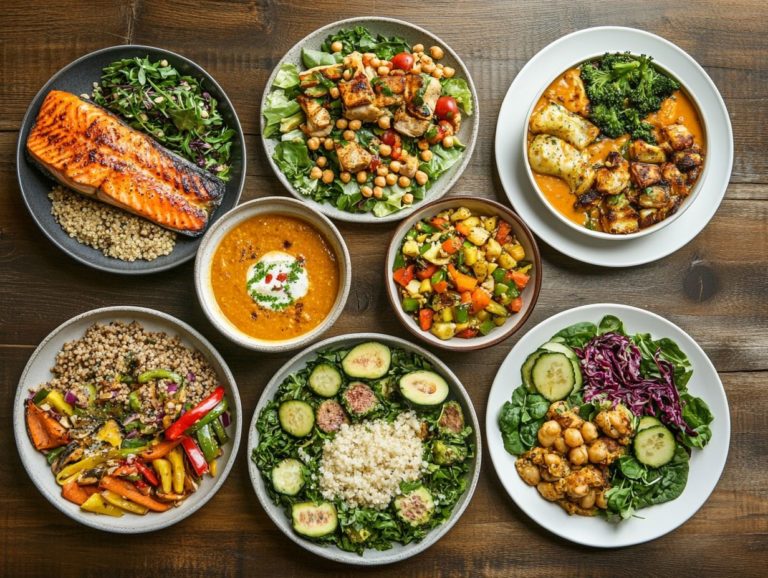How to Evaluate Your Meal Planning Success
Meal planning transcends the mundane task of preparing food; it s a transformative strategy that can elevate your health, conserve your time, and alleviate stress.
You ll uncover a wealth of benefits by planning your meals in advance, empowering you to establish clear goals that resonate with your lifestyle.
Gain insight into evaluating your success through essential metrics, allowing you to refine your strategies for ongoing enhancement.
Discover tips to stay motivated and consistent in your meal planning journey.
Contents
- Key Takeaways:
- Importance of Meal Planning
- Setting Goals for Meal Planning
- Evaluating Your Meal Planning Success
- Adjusting Your Meal Planning Strategy
- Tips for Maintaining Meal Planning Success
- Frequently Asked Questions
- Why is it important to evaluate my meal planning success?
- What are some key indicators of a successful meal plan?
- How often should I evaluate my meal planning success?
- How can I accurately evaluate my meal planning success?
- What are some common challenges when evaluating meal planning success?
- How can I use my evaluation results to improve my meal planning?
Key Takeaways:

- Consistently planning meals ahead can save time, money, and reduce food waste.
- Setting clear goals and regularly evaluating your meal planning success helps identify areas for improvement.
- Consistency, organization, and adaptability are key to maintaining success with meal planning.
Importance of Meal Planning
Meal planning is an essential strategy for reaching your health goals, such as weight loss, by aligning your dietary needs with a structured approach to nutrition. It gives you the power to navigate the intricacies of healthy eating more effortlessly, reducing the feeling of being overwhelmed by too many choices and ensuring that your meals meet the recommended amounts of nutrients for a healthy diet without breaking the bank.
Using meal calendars, shopping lists, and recipes, you can transform the cooking process into a well-organized routine that promotes fresh foods and encourages healthier choices.
Benefits of Planning Meals Ahead
Planning your meals ahead comes with a wealth of benefits, including remarkable time savings and an uplift in diet quality, ultimately paving the way for better health outcomes.
By dedicating time to thoughtfully strategize your meal choices, you can significantly cut down on food waste, ensuring that ingredients are utilized efficiently rather than thrown away. This deliberate approach invites a delightful variety into your meals, encouraging you to explore new recipes and flavors that you might not typically consider.
Meal planning also promotes proper portion sizes, helping you avoid overeating and fostering a more mindful relationship with food. Consequently, it not only supports the maintenance of a balanced diet but also plays a crucial role in enhancing overall lifestyle improvements, nurturing healthier eating habits that can last a lifetime.
Setting Goals for Meal Planning
Establishing clear and achievable goals for meal planning is essential for successfully addressing your dietary needs and health objectives. This foundational step sets the stage for your nutritional journey, guiding you toward the outcomes you desire.
Identifying Your Objectives

Identifying your objectives in meal planning starts with a thorough assessment of your health goals, dietary needs, and nutritional requirements to craft a plan that suits you perfectly.
This process demands a close examination of various factors influencing your eating habits, such as age after all, younger individuals often have different nutrient needs than older adults. Your activity level is another crucial consideration; if you engage in regular physical activity, you may require more protein and carbohydrates to fuel your body effectively. Additionally, any specific dietary restrictions you have whether due to allergies, intolerances, or lifestyle choices like vegetarianism or veganism must be factored in.
By carefully evaluating these elements, you can set clear objectives that guide you in making informed food choices. This thoughtful approach ultimately leads to a balanced meal plan tailored to your unique health needs.
Evaluating Your Meal Planning Success
Evaluating your meal planning success is crucial for assessing how effectively your strategies align with your health goals and dietary needs. Understanding how to use a meal planner effectively ensures that you continue to enhance your nutrition journey, allowing for ongoing improvement and a more tailored approach to your well-being.
Key Metrics to Consider
Key metrics to consider when evaluating your meal planning success include how well you adhere to your established health goals, the efficiency of your cooking process, and your capacity to manage decision fatigue. For a comprehensive approach, check out tips on how to make a meal plan that works for you, which can help reduce feeling overwhelmed by choices.
By honing in on specific elements such as meal frequency and portion sizes, you can uncover valuable insights into your eating habits. A thoughtfully structured meal plan might feature three balanced meals each day, complemented by nutritious snacks to help maintain stable energy levels.
Tracking your satisfaction with dietary choices can reveal your preferences and pinpoint areas that may need adjustments. This holistic approach emphasizes the crucial role of measurement, promoting healthy eating patterns and streamlining your daily decision-making process. This leads to a more enjoyable and sustainable meal experience.
Adjusting Your Meal Planning Strategy
Adjusting your meal planning strategy is vital for continuous improvement. It gives you the power to better meet your dietary needs and facilitates healthier choices that align with your evolving health goals.
Embracing this adaptability will enhance your overall well-being and help you thrive on your journey to better health.
How to Make Changes for Improvement

Making changes to elevate your meal planning involves exploring new recipe ideas, refining your cooking skills, and introducing a broader range of healthy options.
To embark on this journey, consider diving into seasonal ingredients to enhance both flavor and nutrition. Start by selecting just one new dish each week that showcases fresh produce and well-balanced proteins.
In terms of adjusting portion sizes, using smaller plates can be an effective strategy to help regulate servings and prevent overeating. Evaluating food quality is essential; always choose fresh, whole foods over processed alternatives.
As you embrace these practices, you ll not only enhance your cooking skills but also develop a deeper appreciation for diverse flavors while cultivating healthier habits.
Tips for Maintaining Meal Planning Success
Achieving success in meal planning demands your unwavering commitment to consistency and motivation. Make healthy eating a priority to feel your best!
Staying Consistent and Motivated
Staying consistent and motivated in your meal planning is essential for enjoying significant time savings while making healthy choices that align with your nutritional goals.
To maintain this motivation, you can employ several effective techniques. One powerful method is to track your progress using a journal or a digital app. Reflect on your improvements over time. Celebrating small victories like mastering a new recipe or sticking to your meal prep schedule for a week can create a gratifying sense of accomplishment that fuels your ongoing efforts.
Continuously learning about various cooking techniques not only enhances your cooking skills but also keeps the entire process exciting and engaging. Whether you choose online classes, cookbooks, or simply experimenting with new ingredients, expanding your knowledge can invigorate your meal planning journey.
Frequently Asked Questions
Why is it important to evaluate my meal planning success?

Evaluating your meal planning success allows you to track your meal planning progress and make necessary adjustments for a healthier and more efficient meal planning process.
What are some key indicators of a successful meal plan?
Some key indicators include being able to stick to your planned meals, meeting your nutritional goals, and feeling satisfied and energized after meals.
How often should I evaluate my meal planning success?
Aim to evaluate your meal planning at least once a week for best results, but you can also do it on a daily or monthly basis depending on your preferences.
Start today and see how easy meal planning can be!
How can I accurately evaluate my meal planning success?
To evaluate your success, keep a food journal or use a meal planning app. Reflect on your eating habits and satisfaction levels.
What are some common challenges when evaluating meal planning success?
You might face challenges like sticking to your plan or dealing with unexpected cravings. Tracking your food intake can also be tricky.
How can I use my evaluation results to improve my meal planning?
Identify areas for improvement from your evaluation. You have the power to transform your meal planning experience by making changes to your meal plan and trying new strategies for a more enjoyable experience!





